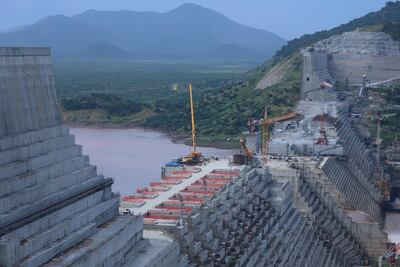Chances of progress in the long-running talks over the disputed Ethiopian dam on the Nile diminished after relations between Egypt, Sudan and Ethiopia hit a new low.
Strained by disputes over the Grand Ethiopian Renaissance Dam, dialogue between the three African nations has become significantly more fraught after recent comments by Addis Ababa that were regarded as hostile by Cairo, and tension on the border between Ethiopia and Sudan.
On Thursday, Cairo summoned the Ethiopian charge d’affaires to complain about comments made by Dina Mufti, the Ethiopian Foreign Ministry spokesman, accusing Egypt of using the dispute over the dam project to cover its internal problems.
The Egyptian Foreign Ministry said the diplomat was told the remarks were a “blatant and unacceptable transgression”, and a provocation to conceal “Ethiopia’s own repeated failures”.
Egypt and Sudan, both downstream of the hydroelectric dam, have been trying to persuade Ethiopia to enter a legally binding deal on its operation and the means of handling future disputes and persistent droughts.
Sunday’s ministerial-level talks, sponsored by the African Union, took place online as a coronavirus prevention measure.
The Egyptian Foreign Ministry said delegates agreed to negotiate for a week before the foreign and water ministers of the three nations meet again to review progress.
Sudan’s quarrel with Ethiopia over the dam escalated after a border dispute flared into deadly clashes.
Ethiopian federal forces are fighting separatist rebels in the Tigray region.
That conflict, which began in November, forced tens of thousands of people, mainly Tigrayans, to seek refuge in Sudan.
Ethiopia’s Prime Minister, Abiy Ahmed, suggested Egypt was trying to drive a wedge between his country and Khartoum, where the military side of a transitional government is close to the Egyptian leadership.
On Saturday, Egyptian President Abdel Fattah El Sisi and Sudan’s head of state, Gen Abdel Fattah Al Burhan, spoke by phone.
Presidential spokesman Bassam Rady said Mr El Sisi assured Gen Al Burhan of Egypt’s “full support of Sudan” because of the “close bond between the national security” of the two countries.
For nearly a decade, the three nations have held negotiations over the dam without agreement.
The Nile meets nearly 95 per cent of Egypt’s water needs.
A significant drop in its share of the river’s water could mean the loss of hundreds of thousands of jobs and the disruption of food supplies.
For Sudan, the absence of co-ordination on the operation of the dam, a short distance from its border, could spell disaster for its eastern food region through flooding, and the disabling of its hydroelectric dams on the Nile.
Indian origin executives leading top technology firms
Sundar Pichai
Chief executive, Google and Alphabet
Satya Nadella
Chief executive, Microsoft
Ajaypal Singh Banga
President and chief executive, Mastercard
Shantanu Narayen
Chief executive, chairman, and president, Adobe
Indra Nooyi
Board of directors, Amazon and former chief executive, PepsiCo
RESULT
Manchester City 1 Sheffield United 0
Man City: Jesus (9')
PROFILE OF HALAN
Started: November 2017
Founders: Mounir Nakhla, Ahmed Mohsen and Mohamed Aboulnaga
Based: Cairo, Egypt
Sector: transport and logistics
Size: 150 employees
Investment: approximately $8 million
Investors include: Singapore’s Battery Road Digital Holdings, Egypt’s Algebra Ventures, Uber co-founder and former CTO Oscar Salazar
Points Classification
1. Marcel Kittel (Germany / Quick-Step) 63
2. Arnaud Demare (France / FDJ) 38
3. Andre Greipel (Germany / Lotto) 25
4. Sonny Colbrelli (Italy / Bahrain) 24
5. Mark Cavendish (Britain / Dimension Data) 22
6. Taylor Phinney (U.S. / Cannondale) 21
7. Geraint Thomas (Britain / Team Sky) 20
8. Thomas Boudat (France / Direct Energie) 20
9. Stefan Kueng (Switzerland / BMC Racing) 17
10. Michael Matthews (Australia / Sunweb) 17
EMIRATES'S%20REVISED%20A350%20DEPLOYMENT%20SCHEDULE
%3Cp%3E%3Cstrong%3EEdinburgh%3A%3C%2Fstrong%3E%20November%204%20%3Cem%3E(unchanged)%3C%2Fem%3E%3C%2Fp%3E%0A%3Cp%3E%3Cstrong%3EBahrain%3A%3C%2Fstrong%3E%20November%2015%20%3Cem%3E(from%20September%2015)%3C%2Fem%3E%3B%20second%20daily%20service%20from%20January%201%3C%2Fp%3E%0A%3Cp%3E%3Cstrong%3EKuwait%3A%3C%2Fstrong%3E%20November%2015%20%3Cem%3E(from%20September%2016)%3C%2Fem%3E%3C%2Fp%3E%0A%3Cp%3E%3Cstrong%3EMumbai%3A%3C%2Fstrong%3E%20January%201%20%3Cem%3E(from%20October%2027)%3C%2Fem%3E%3C%2Fp%3E%0A%3Cp%3E%3Cstrong%3EAhmedabad%3A%3C%2Fstrong%3E%20January%201%20%3Cem%3E(from%20October%2027)%3C%2Fem%3E%3C%2Fp%3E%0A%3Cp%3E%3Cstrong%3EColombo%3A%3C%2Fstrong%3E%20January%202%20%3Cem%3E(from%20January%201)%3C%2Fem%3E%3C%2Fp%3E%0A%3Cp%3E%3Cstrong%3EMuscat%3A%3C%2Fstrong%3E%3Cem%3E%20%3C%2Fem%3EMarch%201%3Cem%3E%20(from%20December%201)%3C%2Fem%3E%3C%2Fp%3E%0A%3Cp%3E%3Cstrong%3ELyon%3A%3C%2Fstrong%3E%20March%201%20%3Cem%3E(from%20December%201)%3C%2Fem%3E%3C%2Fp%3E%0A%3Cp%3E%3Cstrong%3EBologna%3A%3C%2Fstrong%3E%20March%201%20%3Cem%3E(from%20December%201)%3C%2Fem%3E%3C%2Fp%3E%0A%3Cp%3E%3Cem%3ESource%3A%20Emirates%3C%2Fem%3E%3C%2Fp%3E%0A
Results
2pm: Maiden (PA) Dh 40,000 (Dirt) 1,200m, Winner: AF Thayer, Tadhg O’Shea (jockey), Ernst Oertel (trainer).
2.30pm: Maiden (PA) Dh 40,000 (D) 1,200m, Winner: AF Sahwa, Nathan Crosse, Mohamed Ramadan.
3pm: Handicap (PA) Dh 40,000 (D) 1,000m, Winner: AF Thobor, Szczepan Mazur, Ernst Oertel.
3.30pm: Handicap (PA) Dh 40,000 (D) 2,000m, Winner: AF Mezmar, Szczepan Mazur, Ernst Oertel.
4pm: Sheikh Hamdan bin Rashid Al Maktoum Cup presented by Longines (TB) Dh 200,000 (D) 1,700m, Winner: Galvanize, Nathan Cross, Doug Watson.
4.30pm: Handicap (PA) Dh 40,000 (D) 1,700m, Winner: Ajaj, Bernardo Pinheiro, Mohamed Daggash.
UAE currency: the story behind the money in your pockets



